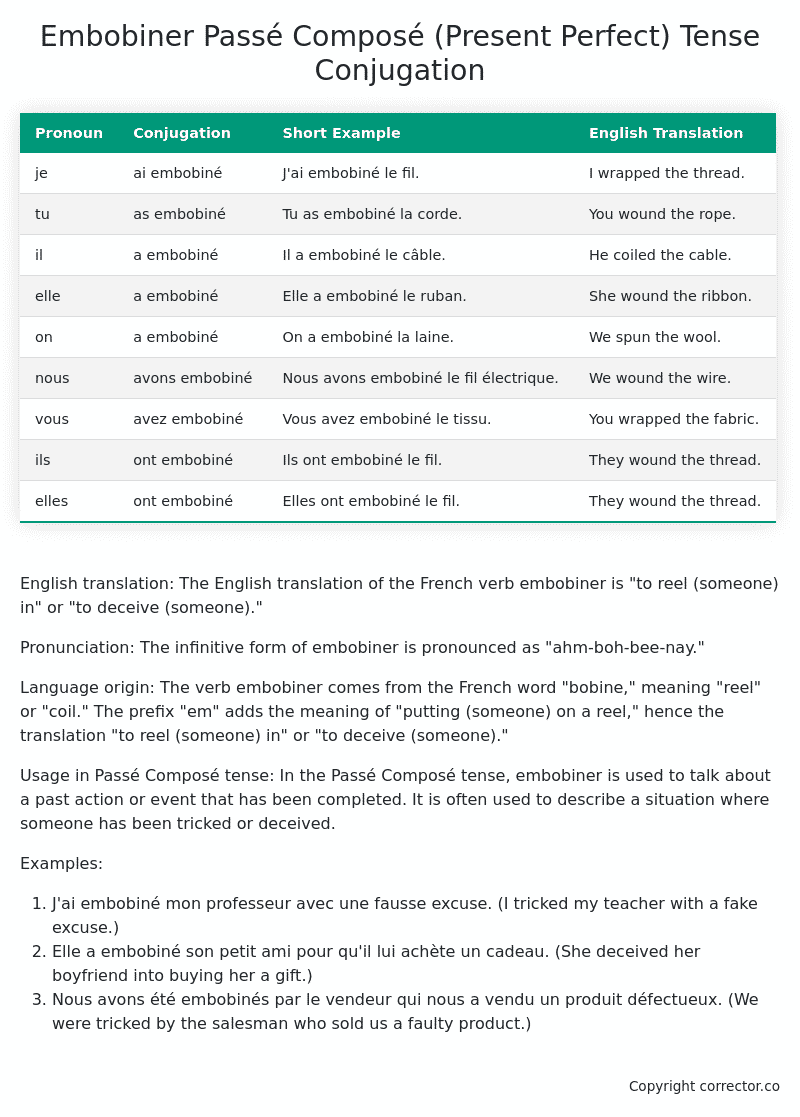Passé Composé (Present Perfect) Tense Conjugation of the French Verb embobiner
Introduction to the verb embobiner
English translation: The English translation of the French verb embobiner is “to reel (someone) in” or “to deceive (someone).”
Pronunciation: The infinitive form of embobiner is pronounced as “ahm-boh-bee-nay.”
Language origin: The verb embobiner comes from the French word “bobine,” meaning “reel” or “coil.” The prefix “em” adds the meaning of “putting (someone) on a reel,” hence the translation “to reel (someone) in” or “to deceive (someone).”
Usage in Passé Composé tense: In the Passé Composé tense, embobiner is used to talk about a past action or event that has been completed. It is often used to describe a situation where someone has been tricked or deceived.
Examples:
- J’ai embobiné mon professeur avec une fausse excuse. (I tricked my teacher with a fake excuse.)
- Elle a embobiné son petit ami pour qu’il lui achète un cadeau. (She deceived her boyfriend into buying her a gift.)
- Nous avons été embobinés par le vendeur qui nous a vendu un produit défectueux. (We were tricked by the salesman who sold us a faulty product.)
Table of the Passé Composé (Present Perfect) Tense Conjugation of embobiner
| Pronoun | Conjugation | Short Example | English Translation |
|---|---|---|---|
| je | ai embobiné | J’ai embobiné le fil. | I wrapped the thread. |
| tu | as embobiné | Tu as embobiné la corde. | You wound the rope. |
| il | a embobiné | Il a embobiné le câble. | He coiled the cable. |
| elle | a embobiné | Elle a embobiné le ruban. | She wound the ribbon. |
| on | a embobiné | On a embobiné la laine. | We spun the wool. |
| nous | avons embobiné | Nous avons embobiné le fil électrique. | We wound the wire. |
| vous | avez embobiné | Vous avez embobiné le tissu. | You wrapped the fabric. |
| ils | ont embobiné | Ils ont embobiné le fil. | They wound the thread. |
| elles | ont embobiné | Elles ont embobiné le fil. | They wound the thread. |
Other Conjugations for Embobiner.
Le Present (Present Tense) Conjugation of the French Verb embobiner
Imparfait (Imperfect) Tense Conjugation of the French Verb embobiner
Passé Simple (Simple Past) Tense Conjugation of the French Verb embobiner
Passé Composé (Present Perfect) Tense Conjugation of the French Verb embobiner (this article)
Futur Simple (Simple Future) Tense Conjugation of the French Verb embobiner
Futur Proche (Near Future) Tense Conjugation of the French Verb embobiner
Plus-que-parfait (Pluperfect) Tense Conjugation of the French Verb embobiner
Passé Antérieur (Past Anterior) Tense Conjugation of the French Verb embobiner
Futur Antérieur (Future Anterior) Tense Conjugation of the French Verb embobiner
Subjonctif Présent (Subjunctive Present) Tense Conjugation of the French Verb embobiner
Subjonctif Passé (Subjunctive Past) Tense Conjugation of the French Verb embobiner
Subjonctif Imparfait (Subjunctive Imperfect) Tense Conjugation of the French Verb embobiner
Subjonctif Plus-que-parfait (Subjunctive Pluperfect) Tense Conjugation of the French Verb embobiner
Conditionnel Présent (Conditional Present) Tense Conjugation of the French Verb embobiner
Conditionnel Passé (Conditional Past) Tense Conjugation of the French Verb embobiner
L’impératif Présent (Imperative Present) Tense Conjugation of the French Verb embobiner
L’infinitif Présent (Infinitive Present) Tense Conjugation of the French Verb embobiner
Struggling with French verbs or the language in general? Why not use our free French Grammar Checker – no registration required!
Get a FREE Download Study Sheet of this Conjugation 🔥
Simply right click the image below, click “save image” and get your free reference for the embobiner present perfect tense conjugation!

Embobiner – About the French Passé Composé (Present Perfect) Tense
Formation of the Passé Composé
Set the auxiliary verb with either
Conjugate the auxiliary verb
Add the past participle
Common everyday usage patterns
Narrating Past Events
Sequential Actions
Describing Completed Actions
Interactions with other tenses
Imperfect Tense
Conditional and Future Tenses
Summary
I hope you enjoyed this article on the verb embobiner. Still in a learning mood? Check out another TOTALLY random French verb conjugation!


